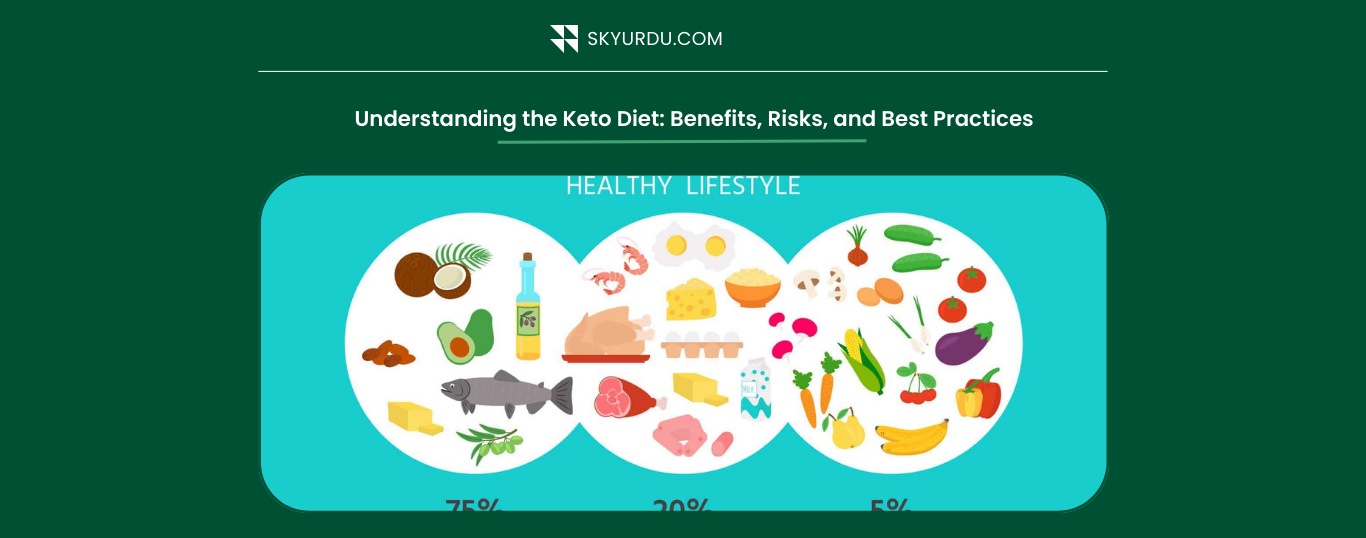The ketogenic diet is also known as the keto diet among people and in recent years there have been a lot of talks going on regarding the keto diet. This diet is well known for boosting energy levels, quick weight loss, and many health benefits and it has attracted a lot of followers who are following this diet for the betterment of their overall health. But it comes with benefits and some risks. In this article, we will discuss the advantages of the keto diet along with its disadvantages and best practices for those who want to try this.
What is the Keto Diet?
The keto diet is a high-fat, low-carbohydrate diet designed to shift the body’s primary energy source from carbohydrates to fats. By drastically reducing carbohydrate intake and increasing fat consumption, the body enters a metabolic state called *ketosis*. In ketosis, the liver converts fat into ketones, which serve as an alternative energy source for the body and brain.
Typically, a standard keto diet consists of approximately:
– 70-75% fat
– 20-25% protein
– 5-10% carbohydrates
This diet ratio is obviously different from the typical and traditional Western diet which is mostly high in carbs but low in fats. Not to mention some people are vegans/vegetarians which put the graph of fat consumption down.
Benefits of the Keto Diet
1. Weight Loss
One of the main reasons people are trying the keto diet is because of weight loss. Obesity and overweight are some of the main issues the world is facing and people find it hard to lose weight, some put in little effort and some do not even understand what it takes to lose weight quickly. The technique should be learnt and it is not that hard. In Ketosis the body burns fat as energy replacing sugar as an energy source. The fat loss is bound to happen when the energy source itself is fat.
2. Improved Blood Sugar and Insulin Levels
The Keto diet can be important since it is beneficial for people with type 2 diabetes or insulin resistance. When the carbohydrate intake is reduced, the blood sugar levels also get lower and insulin sensitivity is improved as well. The need for medication is also reduced.
3. Enhanced Mental Clarity and Focus
Many followers who have taken the keto diet have reported that their mental clarity has increased and cognitive functions have gotten better. This is due to the continuous and proper supply of ketones through the keto diet. This might be more efficient than glucose for the brain.
4. Increased Energy Levels
Once the body adapts to the fat energy source, it discovers sustained energy levels throughout the day. The reason is simple fats are more consistence energy providers as compared to carbs and sugars.
5. Potential Heart Health Benefits
The expected results of the keto diet which is high in fat by an average person might be different, the person would think a diet high in fat can cause harm to health but the truth is different. Keto diet provides good level of HDL Cholesterol and reducing triglycerides. But it is important to note that the fat type matters that is being consumed.
Risks and Drawbacks of the Keto Diet
While the keto diet offers numerous benefits, it’s not without potential risks and drawbacks:
1. Keto Flu
When the body shifts its energy source from sugar to fat many individuals experience a flu called “Keto Flu”. Headaches, fatigue, and dizziness can be the symptoms.
2. Nutrient Deficiencies
Since the keto diet has a restrictive nature, it can lead to deficiencies in essential nutrients such as fibers, vitamins, and others. Many fruits and veggies are limited in the keto diet it’s important to choose nutrient-dense, low-carb foods and take supplements if necessary.
3. Digestive Issues
Some people can experience issues with their digestive system like constipation or even diarrhea by following the keto diet. It’s because of the sudden change in diet and due to low fiber intake. Drink a lot of water and take nonstarchy vegetables.
Best Practices for Following the Keto Diet
If you’re considering the keto diet, here are some best practices to help you succeed:
1. Plan Your Meals
Plan your meals accordingly so you will be taking macronutrients and avoiding hidden carbs.
2. Stay Hydrated and Replenish Electrolytes
While adjusting to the keto diet your body will lose electrolytes, make sure to drink plenty of water and take proper amounts of electrolytes like sodium, potassium, magnesium, etc.
Read More… AC Repair job in Dubai
3. Focus on Healthy Fats
Not all fats are equal even when the diet is high in fats. Take healthy fats not just any fats. Include avocados, nuts, dry fruits, fish, etc.
4. Monitor Your Health
Keep track of your overall health and monitor it while following a keto diet.
Make sure you are not experiencing any side effects, if yes, consult a doctor or a medical expert.
Conclusion
Remember, the key to success with any diet is sustainability. Whether you choose the keto diet or another eating plan, the most important factor is that it supports your long-term health and fits your lifestyle.
